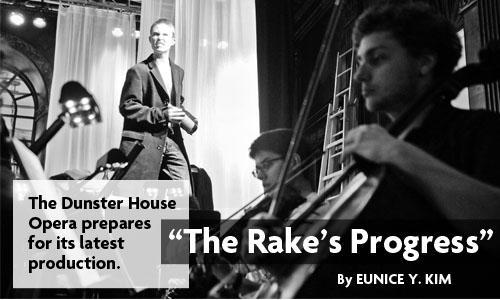
News
Harvard Grad Union Agrees To Bargain Without Ground Rules

News
Harvard Chabad Petitions to Change City Zoning Laws

News
Kestenbaum Files Opposition to Harvard’s Request for Documents

News
Harvard Agrees to a 1-Year $6 Million PILOT Agreement With the City of Cambridge

News
HUA Election Will Feature No Referenda or Survey Questions
Clever Quips and Melodies in 'Rake's Progress'

After two consecutive years of performing the standard Mozartian fare, the Dunster House Opera Society is about to strut new feathers with Igor Stravinsky’s underperformed, yet influential, neoclassical opera “The Rake’s Progress.”
It is DHO policy to alternate between more classical productions and either contemporary or lesser-known work every few years; however, co-producer Clara H. Kim ’09 said that the cast and crew confronted various challenges while staging this modern piece, which conforms to the Mozart model in its organizational structure but strays from those constraints with an offbeat musical content in keeping with Stravinsky’s rhythmic innovations.
“We had some reservations because of the difficulty of the vocal writing, which can be virtuosic and unidiomatic at times, and also the difficulty of the orchestra parts,” Kim said. “However, it was our first choice from almost the beginning of the selection process because of the quality of the libretto, the varied and interesting storyline, and the attractiveness of the music.”
“The Rake’s Progress” is based on a series of mid-18th century paintings by William Hogarth that Stravinsky viewed in Chicago. Stravinsky collaborated with two poets, W.H. Auden and Chester Kallman, to develop the drawings into an operatic plot line. Considering that the DHO only performs operas in English, stage director Victoria J. Crutchfield ’10 said it was especially helpful that they were able to retain the libretto in its native language and maintain the integrity of the plot and character development.
“The characters are archetypes, but they are not limited to those conventions particularly because of Auden’s poetry,” she said. “They never say anything that sounds generic. Everything they say is interesting.”
The basic plot line traces the downfall of the protagonist Tom Rakewell (James B. Onstad ’09), who leaves his sweetheart, Anne Trulove (Eva E.M. Schlitz ’09), and the comforts of the quiet countryside behind for the alluring delights and debauchery of London after coming into an unexpected inheritance. A mysterious character by the name of Nick Shadow (Davone J. Tines ’09) guides Tom into further ruin until Tom is eventually destitute and cursed to insanity.
“Tom is an unsavory character actually, but in many ways he is very human,” Onstad said. “At least his faults are very human, and a lot of the mistakes that he makes are mistakes that all of us make in one time or another.”
Despite the opera’s tragic undertones, Crutchfield said she admired the strength of characters such as Anne. “Anne is an active opera heroine as opposed to a passive ‘I have consumption at the end of the opera’ heroine,” she said.
Schlitz also enjoyed portraying a character with an emotional range that was malleable from the show’s start to finish.
“Anne starts out very young and naïve, and she believes that love is going to conquer everything,” Schlitz said. “[But] in this production, she has a lot of strength and comes into her own by the end.”
Unlike the straightforward and approachable libretto, many still regard the music itself as a significant challenge for the performers and the audience alike. With musical content that is strikingly 20th century, music director Yuga J. Cohler ’11 notes that devices such as irregular and syncopated rhythms contribute to the rather bizarre quality of the music, which is neither completely dissonant nor exclusively modern.
“Stravinsky wrote it in a more convoluted way than was necessary,” Cohler said.
However, Crutchfield believes that the challenging nature of the music will not prevent audiences from enjoying the overall production, especially those who are ordinarily fond of Stravinsky’s compositions.
“The music is not immediately accessible, but it is something that grows on you,” Crutchfield said. “I didn’t appreciate it as much when I first listened to it as I do now. A lot of people like Stravinsky, and I think they will like this.”
The Dunster House Opera Society will open its debut show tonight at 8:30, with other performances following on Sunday and continuing into the next weekend.
—Staff writer Eunice Y. Kim can be reached at kim30@fas.harvard.edu.
Want to keep up with breaking news? Subscribe to our email newsletter.
